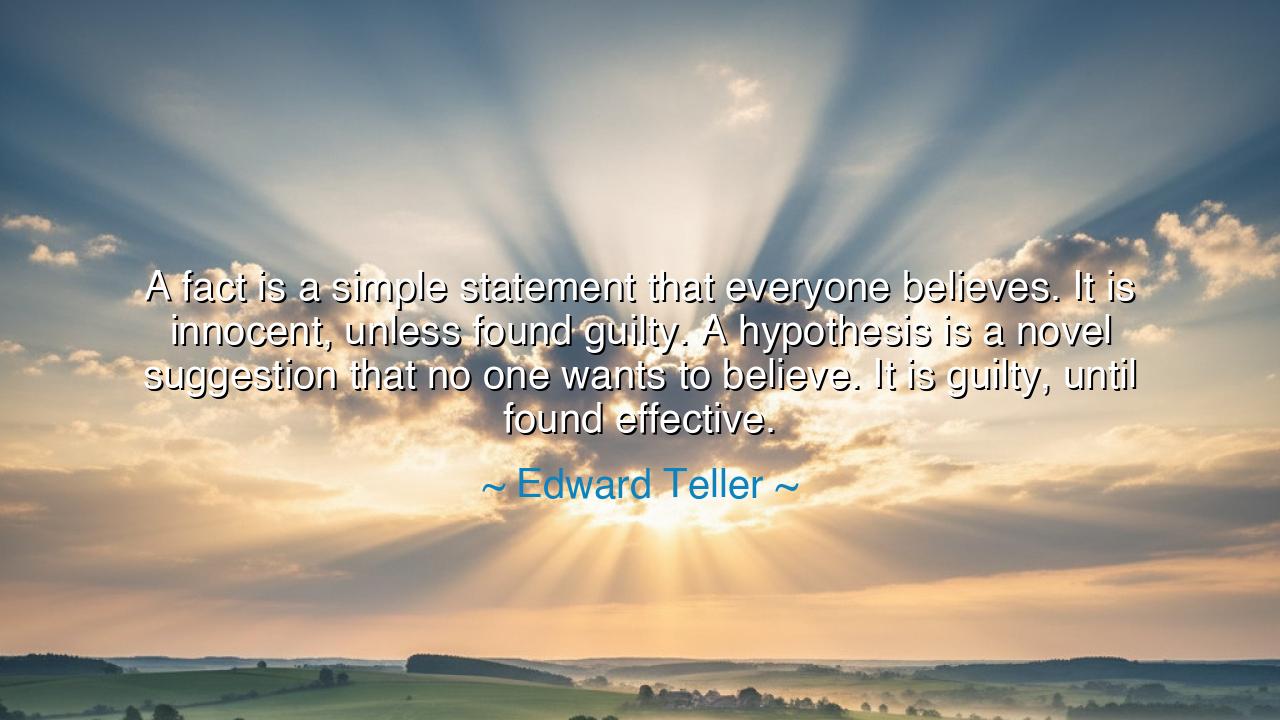
A fact is a simple statement that everyone believes. It is
A fact is a simple statement that everyone believes. It is innocent, unless found guilty. A hypothesis is a novel suggestion that no one wants to believe. It is guilty, until found effective.






“A fact is a simple statement that everyone believes. It is innocent, unless found guilty. A hypothesis is a novel suggestion that no one wants to believe. It is guilty, until found effective.” Thus spoke Edward Teller, a man both revered and feared, who carried the fire of the atom into the service of nations. In these words, he did not speak of bombs or politics, but of the deep rhythm of science itself—the dance between facts and hypotheses, between what is already known and what struggles to be born. His declaration is both a warning and a torch for seekers of truth: that the world is quick to accept what is familiar, and quick to doubt what is new.
The origin of this truth lies in the very nature of human thought. A fact is like a stone lying upon the ground: solid, obvious, accepted by all who pass. Few question it, for it has already been tested, already endured the fire of doubt. A hypothesis, however, is like a spark in the dark. It threatens the order of things. It asks men to consider what they do not yet see, to venture into what may prove false. Thus, while facts are embraced as innocent until proven otherwise, hypotheses are treated as guilty until their strength can be shown. This is not injustice, but necessity—for science must be cautious, lest error masquerade as truth.
History is rich with examples. When Galileo proclaimed that the Earth revolved around the Sun, his idea was a hypothesis, guilty in the eyes of his age. No one wished to believe it, for it shattered old beliefs and threatened powerful institutions. Yet through observation and persistence, his hypothesis became a fact, carved into the stone of knowledge. He endured ridicule and persecution, but time proved him right. Teller’s words echo here: every discovery once stood accused, and only through the trial of evidence did it gain freedom.
Consider also the tale of Ignaz Semmelweis, the physician who suggested that doctors should wash their hands to prevent disease. His hypothesis was mocked and resisted, for it offended the pride of his colleagues. He was treated as guilty, shunned, and broken. Yet years later, when Pasteur revealed the truth of microbes, Semmelweis’ idea became an undeniable fact, saving countless lives. The lesson is clear: truth often begins as a prisoner, condemned by disbelief, before rising as a liberator.
Teller’s words also remind us of the humility required in the pursuit of knowledge. For too often we cling to facts as though they were eternal, forgetting that many once were hypotheses, doubted and despised. What is believed today may be overturned tomorrow. What is mocked today may be the cornerstone of the future. Science advances not by worshiping facts alone, but by daring to test new hypotheses, however unwelcome they may seem.
The ancients glimpsed this wisdom. Socrates declared that wisdom lies in admitting one’s ignorance. Aristotle taught that inquiry begins in wonder, not certainty. Teller, in modern tongue, gives the same warning: beware of the comfort of facts, and do not despise the burden of hypotheses. Both are necessary—the fact to anchor us, the hypothesis to propel us forward. Without facts, we drift in illusion; without hypotheses, we stagnate in complacency.
So, O listener, take this lesson: embrace facts, but hold them lightly; respect hypotheses, though they may seem strange. When you hear a new idea, do not reject it out of pride, nor accept it out of naivety. Let it stand trial, tested by reason and experience. And when you meet resistance in your own pursuit of truth, remember: every great discovery was once considered guilty. Walk, then, as one who seeks—not the comfort of easy belief, but the fire of proven truth. For it is through this struggle that mankind rises, step by step, into the light of understanding.






AAdministratorAdministrator
Welcome, honored guests. Please leave a comment, we will respond soon